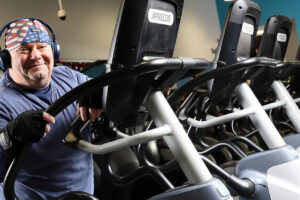While Tony Yodice isn’t from Philadelphia, he feels like Rocky Balboa twice a week. The 79-year-old Monroe resident is fighting the effects of Parkinson’s disease through boxing—and he’s winning.
Tony was diagnosed with Parkinson’s disease five years ago after noticing tremors in his hand. Parkinson’s disease is an incurable disorder of the central nervous system that causes tremors, slow movement, stiffness, and loss of balance. Luckily, Tony’s case was diagnosed early before he lost mobility. To slow the progression, his wife, Theresa, suggested that he try Rock Steady Boxing, a program offered by CentraState’s Physical Therapy Department.
CentraState is one of only a few hospitals in the state to offer this unique high-intensity program that’s designed to maintain or improve strength and function for those with Parkinson’s disease. Research has found that high-impact exercise helps slow the progression of Parkinson’s disease better than lower-impact exercise. Boxing is particularly effective at working the total body.
“At first I didn’t want to tell anyone I had Parkinson’s, but now I’m fighting it with everything that I’ve got,” says Tony, a retired longshoreman who has seen improvements in his balance, coordination, and posture since starting the program about two years ago.
Boxing Basics
Rock Steady Boxing participants are placed in either a beginner or advanced class after an assessment of their abilities by a physical therapist. Classes of 12 to 15 men and women meet up to two times a week for 90 minutes.
The non-contact program includes time to stretch and warm up, followed by workouts using a variety of equipment, including heavy bags, speed bags, jump ropes, battle ropes, and weights. The head-to-toe exercise program also includes activities designed to strengthen eye muscles, vocal cords, and fine motor skills, such as those needed to button a shirt. Progress is assessed quarterly, and the program is complemented with periodic educational support groups. In preliminary research results, participants at CentraState significantly increased walking and turning speeds after three months of participation.
“Rock Steady Boxing is a great way to manage both the physical and psychological effects of Parkinson’s disease,” explains Shannon Lenahan, PT, DPT, certified Rock Steady Boxing coach at CentraState. “Having a support system of people with the same symptoms is just as important as the actual workouts.”
“I hadn’t realized that I’d lost strength in my hands, arms, legs, and even my voice until I started boxing,” says Tony, who has four children and nine grandchildren. “I feel the workouts the next day, but I also feel better. This program is a wonderful gift. Even my doctor is surprised at how well I’m doing.”
For more information about Rock Steady Boxing at CentraState, visit centrastate.com/parkinsons or call 866-CENTRA7 (866-236-8727).





